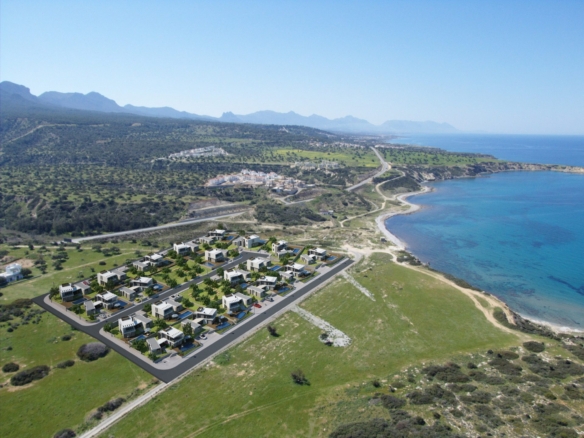The Property Market in Northern Cyprus: An In-Depth Analysis of the 2024 Decline and Outlook for 2025
The property market in Northern Cyprus has witnessed a substantial downturn in 2024, with property sales dropping by approximately 70%. This sharp decline has raised concerns among investors, real estate professionals, and potential homeowners, as Northern Cyprus had previously enjoyed a reputation as a rapidly growing market for foreign investment and property development. However, multiple factors have contributed to this dramatic shift, most notably the introduction of new high tax rates and revised residency permit regulations. In this article, we will explore the causes behind the 2024 decline in the North Cyprus property market, the impact of these new regulations, and the outlook for the property market in 2025.
Factors Contributing to the Decline in Property Sales in North Cyprus
1. Introduction of New Tax Rates
One of the most significant factors influencing the slowdown in the property market in Northern Cyprus in 2024 is the introduction of new high tax rates. These new taxes, aimed at regulating the influx of foreign investments and addressing domestic fiscal concerns, have made property purchases more expensive for investors.
Previously, the property market in Northern Cyprus had been relatively affordable compared to other Mediterranean regions. The lower tax rates and favorable investment conditions attracted significant foreign interest, particularly from buyers in the UK, Turkey, and the Middle East. However, the new tax measures have discouraged many potential buyers, particularly those from abroad, who are now facing higher costs when purchasing properties in North Cyprus.
For instance, the introduction of higher stamp duties, VAT on property transactions, and capital gains taxes have all contributed to the increased financial burden on prospective buyers. These changes have not only made the market less attractive but have also created uncertainty, leading many investors to delay or cancel their property purchases.
2. Changes in Residency Permit Regulations
In addition to the increased taxes, 2024 saw a series of regulatory changes regarding residency permits. Foreign buyers of property in Northern Cyprus had previously enjoyed the privilege of easily obtaining residency permits, which served as a significant incentive for many property investors. However, the introduction of more stringent residency requirements has placed additional barriers to entry for potential buyers.
Previously, foreign nationals who purchased property worth a certain amount were able to automatically apply for a residency permit. This was a key selling point for many investors, particularly those seeking a second home or a retirement property. However, the new regulations have imposed stricter criteria, such as higher minimum property values, additional documentation, and extended processing times. As a result, many foreign buyers have been deterred from entering the market, further exacerbating the downturn in property sales.
3. Limited Supply of Land and Zoning Restrictions
Another critical factor contributing to the market’s slowdown is the limited supply of land available for development in Northern Cyprus, combined with increasingly stringent zoning regulations. The scarcity of available land for new construction projects has resulted in a situation where demand far exceeds supply, leading to rising property prices despite the declining number of transactions.
Zoning regulations, which control where and how properties can be developed, have also become stricter in recent years. These regulations limit the amount of land that can be developed for residential and commercial use, which further reduces the number of available properties for sale. While property prices have continued to rise in certain areas due to this imbalance, the overall market has been subdued as fewer new developments come online to meet the growing demand.
4. Economic Uncertainty and Inflation
The broader economic environment in Northern Cyprus has also played a role in the decline of property sales. Like many other regions, the country has faced economic challenges, including inflationary pressures, currency fluctuations, and a rise in the cost of living. These economic factors have had a direct impact on the property market, as many prospective buyers have become more cautious about making large investments.
In particular, the devaluation of the Turkish lira, which is widely used in Northern Cyprus, has made it more difficult for local buyers to afford property. Additionally, inflation has driven up construction costs, which has been passed on to buyers in the form of higher property prices. As a result, many potential buyers are holding off on their purchase decisions, waiting for greater economic stability before committing to such a significant investment.
5. Global and Regional Market Dynamics
Finally, the broader geopolitical and global economic climate has also influenced the property market in Northern Cyprus. The ongoing political situation in the region, coupled with the uncertainty caused by global events such as the COVID-19 pandemic and the war in Ukraine, has affected investor sentiment. In particular, foreign investors who had previously seen Northern Cyprus as an attractive destination for property investment are now taking a more cautious approach, given the uncertainties surrounding the region.
Impact of the New Tax Rates and Regulations
The introduction of higher taxes and stricter residency requirements has had a profound impact on the North Cyprus property market. For foreign buyers, the combination of these regulatory changes has made it more difficult and costly to invest in property. The new tax regime has increased the overall cost of purchasing property, while the residency regulations have made it more complicated for foreign nationals to obtain the necessary permits.
For local buyers, the increased cost of property transactions due to higher taxes has also created additional financial strain. Many potential buyers who were previously able to afford property in Northern Cyprus are now finding themselves priced out of the market or facing higher costs than anticipated. As a result, the market has experienced a significant decrease in demand, which has led to the 70% drop in property sales in 2024.
Despite these challenges, there are still areas of the market that remain resilient. For instance, certain high-demand locations, such as coastal regions and key tourist areas, continue to experience price increases, albeit at a slower pace than in previous years. This suggests that while the overall market may be in decline, there are still pockets of opportunity for investors who are willing to navigate the changing regulatory environment.
The North Cyprus Property Market Outlook for 2025
Looking ahead, the North Cyprus property market is expected to continue facing challenges in the near term, particularly as the effects of the 2024 tax and regulatory changes continue to be felt. However, there are several factors that could contribute to a gradual recovery and potential opportunities for both local and foreign investors.
1. Stabilization of Tax Policies and Regulations
In the coming years, it is expected that the government of Northern Cyprus will evaluate the effectiveness of the new tax policies and residency regulations. While these changes were introduced to address fiscal concerns and regulate foreign investment, there is a possibility that some of the measures may be adjusted or softened to stimulate the property market.
If tax rates are adjusted to a more competitive level or residency requirements are eased, the property market could see a resurgence of foreign interest. Many investors are waiting for signs of stability and clarity in the regulatory framework before re-entering the market, and any positive changes in this regard could help restore confidence and boost demand.
2. Long-Term Growth Potential
Despite the short-term challenges, Northern Cyprus still offers long-term growth potential for property investors. The region’s natural beauty, favorable climate, and relatively low cost of living continue to make it an attractive destination for retirees, second-home buyers, and expatriates.
Furthermore, Northern Cyprus remains one of the more affordable real estate markets in the Mediterranean, which could be an appealing factor for buyers looking for an investment property with growth potential. As infrastructure development continues, particularly in key tourist areas, the demand for residential and commercial properties could pick up again in the coming years.
3. Increasing Interest in Rental Properties
With property sales declining, some investors may shift their focus to rental properties, which remain a viable option in Northern Cyprus. Tourism continues to be a key driver of the economy, and rental properties, particularly those in popular areas such as Kyrenia, Famagusta, and the Karpaz Peninsula, are in demand throughout the year.
Investors who are able to adapt to the changing market conditions and focus on rental income could find opportunities to generate steady returns, even if property sales remain slow in the short term.
Property Price Trends Across Key Locations in North Cyprus (2024)
As of the last quarter of 2024, property prices across key locations in Northern Cyprus showed moderate increases, though the overall market slowdown has been evident. Here’s a breakdown of property sales and price trends across various cities:
- Nicosia (Lefkoşa):
- Apartments for Sale: +8.06%, £904.41/m²
- Villas for Sale: +1.91%, £1226.98/m²
- Girne (Kyrenia):
- Apartments for Sale: +2.75%, £1582.64/m²
- Villas for Sale: +1.66%, £2029.39/m²
- Famagusta (Gazimağusa):
- Villas for Sale: +0.4%, £1565.14/m²
- Iskele:
- Apartments for Sale: -2.95%, £1801.85/m²
These figures reflect the ongoing price increases in key areas, despite the broader market slowdown. While some areas have seen a dip in property prices, others have managed to maintain moderate increases, suggesting that demand is still strong in certain locations.
Conclusion
The property market in Northern Cyprus has faced significant challenges in 2024, with a sharp decline in sales attributed to new tax rates, stricter residency regulations, and limited land supply. However, despite these hurdles, the market remains resilient, particularly in high-demand areas such as Nicosia, Kyrenia, and Famagusta. As we look ahead to 2025, the property market may begin to stabilize, provided that the government adjusts tax policies and residency regulations to foster investment. For investors and homebuyers, understanding the evolving landscape and seeking professional guidance will be crucial in navigating the North




